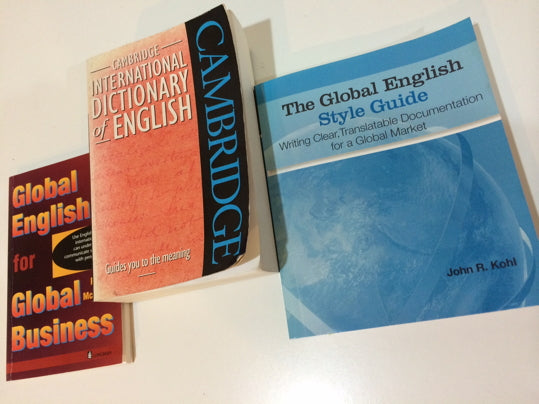The goal of global English is to be intelligible. Not to speak or write impeccable Standard English but to communicate our meaning successfully to people whose English is different from our own.
Native English speakers are becoming aware that our own brand of local English isn't always clear to people outside our privileged circle. Writing English that is likely to be translated accurately is a special challenge. Luckily we can learn a lot about international communication from a handful of books.
In 1997, nobody cared about global English. But today, people using English as a second or third or other language outnumber native English speakers by 3:1. And one billion people are learning English right now. All these people are communicating with each other, and they have sensibly abandoned any attempt to reproduce a mythical standard English. Instead, they just want to be understood. Consciously or intuitively, they are using global English.
Technical writers have a special responsibility to make their documentation easy for an international audience to understand. Much of their documentation will be translated, which requires a knowledge of how to tweak plain English for easy transition across languages and cultures.
Resources on translatable English
1. Global English for Global Business by Rachel McAlpine
The original edition of this book was first published by Pearson Education in 1997, and almost universally ignored at the time. I was fresh back from living and working in Japan. There I had figured out techniques that made lectures comprehensible to Japanese audiences, most of whom had learned English from grammar books and Japanese teachers. This is a short and simple manual with 13 basic guidelines, including the surprising problems of mini-words.
Updated ebook Global English for Global Business
2. The Cambridge International Dictionary of English
I still trust my 1995 copy of this hefty dictionary and consult it often (although I need reading glasses today).
It shows differences between British, American and Australian English. Creates definitions from only 2000 common words. Identifies false friends: words that appear similar in two languages, but have very different meanings. Gives numerous examples of usage. And has plenty of illustrations and charts.
This type of specialised dictionary draws attention to the difficulties experienced by ESL users. If you’re writing English for people from a different language background, I recommend you get an international dictionary of this type. You’ll find it useful and learn a lot.
Cambridge Advanced Learner's Dictionary replaces the old International Dictionary of English.
3. The Global English Style Guide: Writing clear, translatable documentation for a global market by John R. Kohl
If you are deadly serious about writing documentation that is safe in the hands of translators (machine or human), you will need this brilliant book. It is not for the faint-hearted. It’s an extremely detailed explanation of the syntactic cues and other triggers for confusion, with granular analysis and many precise examples. I would suggest reading it through once, and then skim-reading it every time you edit any significant document — until you feel confident. A solid chapter on punctuation and capitalisation alone conveys a depth of understanding.
The Global English Style Guide by John R. Kohl
The following resources are recommended by John Taylor, for which many thanks.
4. The Guide to Translation and Localization from the American Translators Association and Lingo Systems

This guide is another immensely helpful document. Its writing guides for localization and chapters on localization of software are immediately useful.
Soonish: a short course on writing translatable English
In a few months, Contented will release a short course on writing global English. This will be an easily digestible introduction to principles that are important in this connected world: a world where we constantly communicate with people from a different language background. Is Global English really different from plain English? You will be surprised — and well prepared to make yourself understood internationally.
Background information:
http://www.britishcouncil.org/learning-faq-the-english-language.htm


Leave a comment: